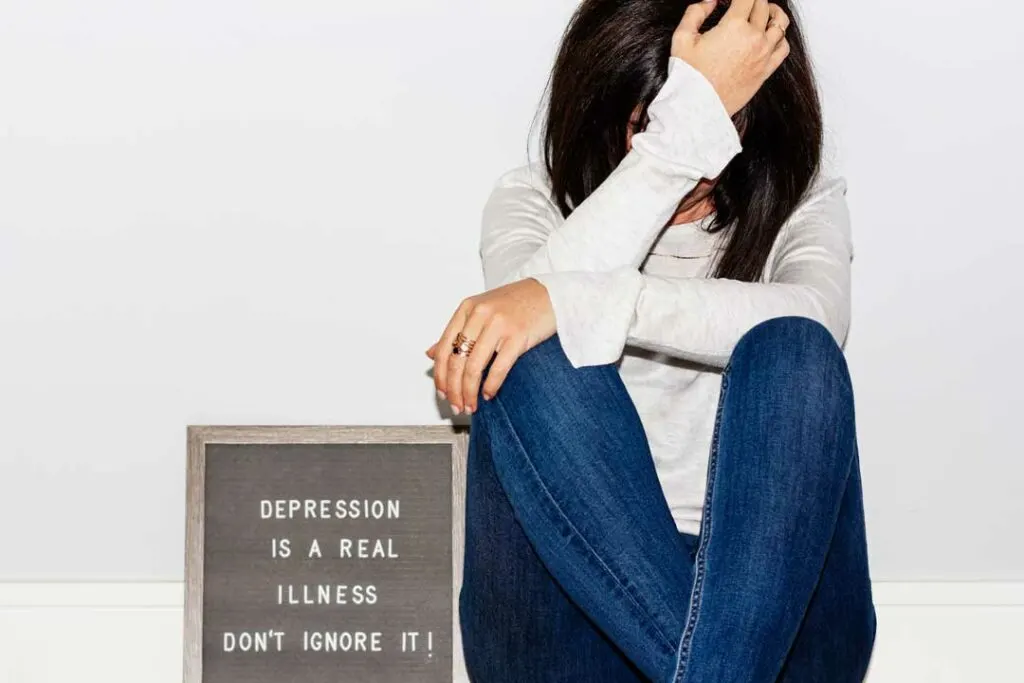Effective strategies for dealing with depression can transform your mental health journey, offering hope, relief, and actionable steps toward recovery.
Dealing with depression can feel overwhelming, but effective strategies for managing it can make all the difference. From therapy to simple lifestyle changes, these tips empower you to take control of your mental health and start feeling better
Effective Strategies for Dealing with Depression: Tips for Recovery

Dealing with depression can feel overwhelming, but there are effective ways to manage it and improve your daily life. Finding a balance in your lifestyle can have a significant impact on your mental health, starting with small changes that build up over time. Whether it’s through engaging in regular physical activity, maintaining a balanced diet, or seeking social support, small steps can make a big difference.
Understanding that depression varies from person to person is crucial. Symptoms can include feelings of sadness, irritability, and a lack of interest in usual activities. Recognizing these signs can be the first step toward managing them. Engaging in activities that promote relaxation, like breathing techniques or mindfulness, can help calm your mind.
Exploring professional treatment options like therapy or medication is vital when self-help strategies aren’t enough. It’s essential to know that seeking help from professionals is a sign of strength, not weakness. Tackling depression takes courage and consistency, but with the right approach, you can find a path to feeling better.
Key Takeaways
- Small lifestyle changes greatly impact mental health.
- Recognize and manage symptoms of depression.
- Seek professional help as needed for effective recovery.
Understanding Depression

Depression is a widespread condition affecting mood and mental health. It’s characterized by persistent feelings of sadness, which can significantly impact daily life. This section will explain common symptoms, discuss potential causes and risk factors, and cover various types of depression.
Symptoms of Depression
Depression can manifest in several ways, impacting both mental and physical health. Common symptoms include persistent sadness, hopelessness, and a loss of interest in activities you once enjoyed. You may experience changes in appetite or sleep patterns. Others might notice diminished energy levels, difficulty concentrating, or irritability.
Feelings of worthlessness or guilt are also frequent. In severe cases, thoughts of death or suicide might occur. Physical symptoms, such as unexplained aches and pains, can also accompany depression. Recognizing these signs is crucial, as they indicate the presence of a mood disorder that needs attention.
Causes and Risk Factors
Depression is a complex condition, often caused by a combination of factors. Genetics play a significant role, so if you have a family history of depression, your risk may be higher. Life experiences, including trauma, chronic stress, or the loss of a loved one, can trigger depressive episodes.
Biological differences in brain structure and chemistry can also influence mental health. Additionally, medical conditions like chronic illness or certain medications might increase your vulnerability. Socioeconomic aspects such as loneliness or lack of support can further exacerbate feelings of depression. Each individual’s experience with depression is unique, shaped by a variety of factors.
Types of Depression
Depression is not one-size-fits-all; it encompasses several types and subtypes, each with distinct characteristics. Major depressive disorder is the most common, featuring intense symptoms that last longer than two weeks. Persistent depressive disorder involves a chronic form of depression, where mild yet long-lasting symptoms may persist for years.
Bipolar disorder includes depressive episodes but is marked by alternating moods of depression and mania. Seasonal affective disorder is linked to changes in weather, often occurring in winter months. Additionally, postpartum depression affects new mothers, characterized by depressive symptoms following childbirth. Understanding the different types helps in seeking appropriate treatment options tailored to your specific needs.
Depression Therapy
Depression therapy focuses on identifying and addressing negative thoughts and emotions. This approach is aimed at helping you manage symptoms and improve your quality of life. Techniques like cognitive-behavioral therapy (CBT) target harmful thought patterns, helping you develop healthier ways of thinking and behaving.
Therapists work with you to create a treatment plan tailored to your needs. Psychotherapy techniques, such as cognitive therapy for depression, can help challenge and change the thoughts that lead to low mood. Additionally, interpersonal therapy can enhance your social relationships, often strained by depression.

Effective therapy involves more than just talking. It offers structured techniques to help you take charge of your mental health. Including mindfulness and meditation in your routine can further support your healing journey. These practices foster awareness, reducing stress and enhancing emotional wellness.
When considering therapy options, it’s important to choose the right professional. In large cities like New York, an experienced depression therapist can provide evidence-based interventions like CBT. These professionals understand the complexities of depression and offer compassionate care.
Remember, therapy is a collaborative process. It’s essential to communicate openly with your therapist to achieve the best results. This continuous interaction helps modify treatment approaches to suit your evolving needs, ensuring effective management of depression symptoms.
Professional Treatment Options

Dealing with depression can often require professional treatments tailored to your specific needs. It’s important to explore psychotherapy, medications, and alternative therapies, as each can offer unique benefits.
Psychotherapy
Psychotherapy involves talking with a mental health professional to figure out patterns and triggers connected to your depression. One common type is cognitive behavioral therapy (CBT), which helps you identify negative thought patterns and develop healthy coping skills. CBT is often recommended due to its structured approach and focus on practical solutions.
In addition, therapists may also use interpersonal therapy (IPT) to focus on improving relationships and communication, which can alleviate depressive symptoms. Consulting a therapist can support your journey to regain control and find fulfillment in life.
Medications
Medications often play a crucial role in treating depression. Antidepressants are commonly prescribed and work by balancing chemicals in the brain. The most frequently used types include selective serotonin reuptake inhibitors (SSRIs) and serotonin-norepinephrine reuptake inhibitors (SNRIs).
Your doctor or psychiatrist may suggest trying different antidepressants to find the one that works best for you. Medication combined with therapy can be particularly effective, as it addresses both chemical and psychological aspects of depression. Monitoring progress with your healthcare provider is essential to make any needed adjustments.
Alternative Therapies
Alternative therapies focus on holistic approaches to treat depression. Acupuncture, for example, has been noted for its ability to improve mood and emotional balance. Another option is art therapy, which encourages self-expression and creativity to explore and manage emotions. These therapies offer benefits without the side effects often associated with medication.
These approaches can be excellent for those seeking non-traditional treatments that complement other methods. Always discuss with a healthcare provider before starting any alternative therapy to ensure it fits well with your overall treatment plan.
Self-Help and Management

Taking care of yourself when dealing with depression can involve creating a support system, making lifestyle changes, and practicing mind-body techniques. These strategies can improve your daily routine and help manage symptoms like stress and hopelessness.
Building a Support System
Connecting with friends and family is important. Having someone to talk to can help lift your spirits and provide a sense of belonging. Reach out to those who make you feel positive and safe.
Consider joining support groups either online or in your community. Discussing your feelings with others facing similar challenges can be comforting. Communication is key. Share your feelings and listen to others. This can reduce feelings of isolation and increase positive emotions.
Look for professional help if needed. Therapists or counselors can offer guidance and coping strategies tailored to your needs. They can also help you set realistic goals to improve your emotional well-being.
Lifestyle Changes and Coping Strategies
Exercise is vital for managing depression. Whether it’s jogging, walking, or regular exercise at home, staying active boosts mood and reduces fatigue. Incorporate physical activities into your daily routine to experience these benefits.
Eating a balanced diet also plays a crucial role. Focus on lean meats, vegetables, and grains. Reducing caffeine and alcohol can also help stabilize your mood.
Practicing gratitude and journaling can change how you perceive daily challenges. Write down things you’re thankful for or positive moments in your day. This practice can enhance positive emotions and provide a new perspective.
Being in nature is another great way to cope. Spend time outdoors whenever possible. Natural surroundings can lower stress levels and improve your mood.
Mind-Body Techniques
Try relaxation techniques like yoga or tai chi. These practices combine physical movement, breathing, and mindfulness. They promote relaxation and can lower stress. Mindfulness involves focusing on the present, which can lessen anxiety and improve concentration.
Breathing exercises, such as box breathing, can calm your mind. To practice this, breathe in for four counts, hold for four, exhale for four, and hold again for four.
Engaging in these activities regularly can help you manage symptoms and foster a sense of peace. Explore what works best for you and make these techniques part of your daily routine.
Overcoming Negative Thoughts and Emotions

Dealing with depression involves focusing on both managing negative thoughts and nurturing positive emotions. By identifying and challenging negative thinking, you can build strategies to improve your mental state. At the same time, fostering positive emotions such as joy and gratitude can provide emotional strength.
Identifying and Challenging Negative Thinking
Identifying negative thoughts is a crucial first step. Pay attention to patterns in your thinking that might be overly negative or exaggerated. These thoughts may include feelings of worthlessness or hopelessness.
Once you recognize these patterns, you can begin challenging them. Ask yourself if these thoughts are based on facts or assumptions. A technique from cognitive behavioral therapy involves questioning the evidence for and against your negative thoughts. This helps shift your mindset and can lead to healthier thinking patterns.
Cognitive Behavioral Therapy Techniques:
- Identify distortions in your thinking.
- Challenge these distortions with facts.
- Replace negative thoughts with balanced ones.
You might find it useful to write down negative thoughts and counter them with realistic ones. This practice helps you gain a sense of control over your emotions.
Fostering Positive Emotions
Nurturing positive emotions is essential in coping with depression. Simple actions such as practicing gratitude or performing acts of kindness can uplift your mood. Consider keeping a gratitude journal to note things you appreciate daily.
Ways to Foster Positive Emotions:
- Engage in activities that bring joy.
- Reflect on accomplishments, no matter how small.
- Show love and kindness to others.
Building on positive emotions can create a buffer against sadness. Participating in activities that foster joy, such as spending time with loved ones or engaging in hobbies, can enhance your emotional well-being. Emphasizing gratitude for even the smallest things can cultivate a more positive outlook on life.
Building Resilience and Seeking Joy

Building resilience and finding joy are essential steps in managing feelings of sadness and overcoming depression. By fostering supportive relationships, engaging in enjoyable activities, and embracing life improvements, you create pathways to love and positive emotions.
Cultivating Healthy Relationships
Surrounding yourself with supportive people is key to resilience. Reach out for help when you need it. Staying connected with family and friends prevents isolation and brings feelings of love and joy. Engaging in social activities boosts mood by offering chances to share experiences and emotions.
Consider creating a list of people you can talk to when feeling low. Volunteering can also enhance your sense of purpose and accomplishment. It strengthens your ties to the community while providing opportunities to build new relationships.
Engaging in Pleasurable Activities
Dedicate time each day to activities that bring joy. Identify hobbies or activities you love and make them a part of your routine. These activities should be simple and enjoyable, like reading a book, gardening, or listening to music. They help elevate your mood and create positive emotions.
Participate in activities that spark creativity and pleasure. Make a list of things that bring you joy and strive to do one each day, no matter how small. Remember that even minimal effort in engaging activities can have significant positive effects on mental health.
Embracing Life Enhancements
Embrace life by making small changes that lead to greater happiness. This can include daily practices like gratitude journaling or meditation. Such enhancements support mental well-being and help you to find joy and love in everyday moments.
Pursue goals that are meaningful to you. Set small, achievable objectives and celebrate each accomplishment. Making lists or keeping a journal can help track progress and maintain a sense of achievement. Consistently reaching small goals builds resilience and reinforces your ability to overcome feelings of sadness.
Consider exploring new environments or learning something new as a way to embrace life and enhance joy. Trying different activities can also lead to discovering new sources of happiness and satisfaction.
Frequently Asked Questions
Managing depression often involves a combination of professional help and personal strategies. Therapy and medication can be essential. Additionally, setting small, manageable goals and maintaining a routine are beneficial. Regularly practicing relaxation techniques and finding activities you enjoy can also help reduce symptoms.
Improving your mood can start with small changes. Listening to music you love, engaging in creative activities, or spending time with pets can lift your spirits. Connecting with nature by walking in a park or gardening may also provide a mood boost.
Exercise is known to have a positive effect on mood. Regular physical activity can boost the production of endorphins, chemicals in your brain that act as natural painkillers and mood elevators. Activities like walking, jogging, or yoga can be particularly effective.
Talking to someone, whether a friend, family member, or therapist, can provide support and relief. It helps you express feelings and gain different perspectives. Talking can also help identify underlying issues and explore solutions.
Eating a balanced diet rich in whole grains, lean protein, fruits, and vegetables can support mental health. Omega-3 fatty acids found in fish like salmon and nuts like walnuts may help reduce symptoms of depression. Limiting sugar and processed foods is also recommended.
Sleep is crucial in managing depression. Poor sleep can worsen symptoms, while good sleep quality can enhance mood. To improve sleep, maintain a regular sleep schedule, create a restful environment, and avoid screens before bed. Limiting caffeine and alcohol may also help.
Coping with Depression: Effective Strategies for Better Mental Health
Taking charge of your mental health starts with learning effective strategies for dealing with depression. Whether through therapy, lifestyle changes, or self-care practices, these actionable steps provide a foundation for recovery. Remember, seeking help is a sign of strength, and with consistent effort, you can achieve a brighter, healthier future.

Jessi is the creative mind behind The Coffee Mom, a popular blog that combines parenting advice, travel tips, and a love for all things Disney. As a trusted Disney influencer and passionate storyteller, Jessi’s authentic insights and relatable content resonate with readers worldwide.
